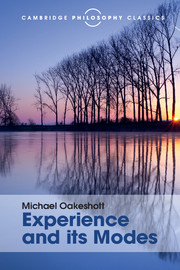Preface to this edition
Published online by Cambridge University Press: 05 November 2015
Summary
Like many classics, Michael Oakeshott's Experience and its Modes was not recognized as such when it first appeared in 1933. Indeed, it took more than thirty years for the initial print run of 1,000 copies to sell out, though it has been reprinted several times since. The reason for this early neglect is not hard to fathom. In England and especially Cambridge in the 1930s, analytic philosophy as espoused by G. E. Moore, Bertrand Russell and the young Wittgenstein was on the rise. In such an atmosphere, it was unlikely that Oakeshott's book, which was deeply indebted to the idealism of Hegel and F. H. Bradley, would receive a sympathetic hearing. But philosophical fashions change, and Oakeshott's Hegelian attack on empiricism and his anti-foundationalist call for a theory of knowledge that grasps, “even more thoroughly than Hegel's, the fact that what we have, and all we have, is a world of ‘meanings’” (47) now seem ahead of their time.
Although the philosophical approach of Experience and its Modes is rooted in the nineteenth century, its concern is with decidedly twentieth-century problems. The most important of these is: What, in this age of science and social science, is the task of philosophy? In the introduction, Oakeshott states clearly that the purpose of the book is to explore the implications of a certain conception of philosophy as “experience without presupposition, reservation, arrest or modification” (2). He elaborates this conception by differentiating philosophical experience from three of the most important forms of non-philosophical experience: science, history and practice. Against the three great reductivisms of our age – scientism, historicism and pragmatism – Oakeshott seeks to vindicate the autonomy and, indeed, the superiority of philosophy. This provides the crucial epistemological basis for his later understanding of the nature of philosophical reflection on politics.
In addition to being concerned with philosophy and its relationship to the various forms or ‘modes’ of non-philosophical experience, Experience and Its Modes is also concerned with the individual modes themselves and their relationship to one another. In this regard, the chapter on history is by far the most original and attracted the most attention. R. G. Collingwood went so far as to call it “the most penetrating analysis of historical thought that has ever been written”. In his analysis, Oakeshott is particularly concerned to protect history from the irrelevant intrusions of philosophy, science and practice.
- Type
- Chapter
- Information
- Experience and its Modes , pp. vii - viiiPublisher: Cambridge University PressPrint publication year: 2015

